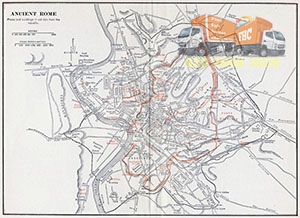Rubbish removal is one of the fundamental aspects of hygiene, sanitation and disease-free habitation for people around the world. In modern times, rubbish removal is done by trained personnel, equipped with purpose-built rubbish collection vehicles. If it weren’t for these people, commonly known as garbage men, our habitat might have been quite unliveable.
Rubbish collection and disposal is a continuous process which is still undergoing some transformations in order to make it more efficient and resultant. Rubbish removal efforts have been around since the dawn of civilisation.
Some of the earliest known garbage removal efforts date back to the year 3000 BC, when the first landfill was developed near Knossos on the island of Crete, Greece. Once the garbage pits were full, Cretans topped off the holes with dirt and rocks in order to seal them. A layer of dirt and rock was also applied at different levels before the pit was full as it kept the hole stable and prevented the ground from collapsing due to rotting of waste below.
About a thousand years later, China was applying different methods for composting and recycling waste. The Chinese were quite keen and skilled in recycling as they were able to reuse discarded bronze and remake it into other bronze items or stored the recycled material in bulk for later use.
In the year five hundred BC, Athens in Greece was the first ever human settlement to regulate rubbish removal and waste management for its citizens. The newly forged law stated that any rubbish dumping within one mile of city bounds is prohibited and punishable.
The Plague or Black Death as it was known is one of the most horrible disease outbreaks in the world to date. The European continent saw the death of over twenty five million people in less than five years. All of this could have been avoided if there were at least a small effort to maintain hygiene in towns, villages and cities. Obviously, a proper rubbish removal system would be too much to ask in those days.
 Britain was the first country to take an organised jab at rubbish collection. Although the methods used were very crude they were effective. Garbage in the street was collected by men known as rakers, as they used a rake to pick up rubbish and toss in a cart. These were the men to forge the future of proper garbage men and rubbish removal.
Britain was the first country to take an organised jab at rubbish collection. Although the methods used were very crude they were effective. Garbage in the street was collected by men known as rakers, as they used a rake to pick up rubbish and toss in a cart. These were the men to forge the future of proper garbage men and rubbish removal.
From the seventeen hundreds all the way to the start of the twentieth century, rubbish collection methods and waste management practices have been going through a trial-and-error stage during which many good ideas came up and caught on, whereas others were tossed out as rubbish because they were. Nevertheless, rubbish collection and disposal methods developed notably over the period on question.
During the first quarter of the twentieth century, rubbish collection methods did not evolve too much – dumping remained a favourite and widely practised form of disposal. Since the nineteen thirties onwards, legislation has developed and dealing with waste was getting more effective and adequate.



